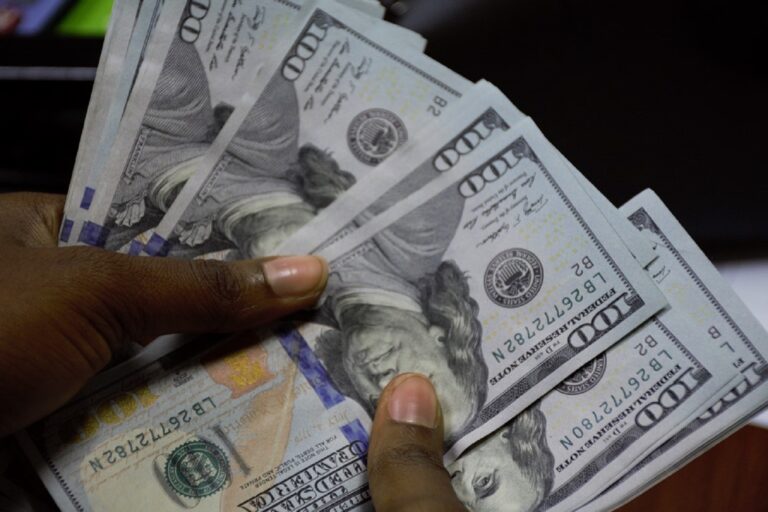
Exchange Rate
Newsonline Nigeria reports that the parallel exchange rate (black market rate) always differs from the CBN rate. The exchange rate between the USD and the Nigerian Naira significantly impacts the Nigerian economy.
In the investors’ and exporters’ window of the official market, the United States Dollar (USD) opened at N762.63/$1 on Friday, 7 July.
The FMDQ Exchange, the official foreign exchange rate aggregator, reported that the rate surpassed the N742.31/$1 rate dollar that was offered the previous trading session.
This indicates the authorised dealers increased their asking price by N20.32 kobo, with the value of the naira depreciating by 2.73 per cent.
Although in the black market, the Naira Rates, a parallel market aggregator, said the American greenback was stable at N772/$1.
This was the average rate the dollar was sold in the Bureau De Change window of the black market during trading the previous day.
The European currency, the euro, shed some value in the parallel market to the naira, as both currencies were exchanged at an average rate of N851.9/€1.
It was slightly lower than the N854.1/€1 rate both the European currency and Nigerian banknote traded at on Wednesday according to the aggregator.
Foreign traders saw an increase in the cost of the British pound, which was sold at a higher rate of N997.10/£1, compared to the preceding day’s N996.8/£1 rate.
Meanwhile, the Chairman of the Major Oil Marketers Association of Nigeria (MOMAN), Olu Adeosun, has stated that the pains caused by the unification of the dollar won’t last.
“I believe that in the long-term, the prospects are there; the pain we are going through now over fuel subsidy removal, FX unification, will not last,” Adeosun told Channels TV.
He made the comment amid the increase in fuel prices, which was caused by the unification of the multiple foreign exchange rates by President Bola Tinubu.
Recall that the gap between the official and black market was over N200 before June 14, when the unification was implemented, but it has reduced to N9.37 kobo.
The reduction in the gap led to the oil marketers buying and selling the fuel according to the market reality of the dollar rate. Prior to the unification, the Nigerian National Petroleum Company (NNPC) Limited sold the fuel to the oil marketers at an official rate below N500/$1, but following the unification, the rate the fuel is sold is pegged to over N700/$1.
Below you can see the chart for the Nigerian Naira rate today compared to the Dollar.
| 1 USD = 777.58 NGN |
| 1 Dollars = 777.58 Nigerian Naira |
| The USDNGN rate as of 7 Jul 2023 at 8:55 AM |
Here are some of the causes of the dwindling dollar to naira exchange rate.
Inflation Rates: It is well known that inflation directly impacts black market exchange rates. If the Nigerian economy can be stabilized and inflation is controlled, the naira will benefit; however, if the naira continues to fall, it may indicate that food and other necessities are becoming more expensive daily.
Interest Rates: Another tool to keep an eye on is interest rates. If the interest rate at which banks lend money rises, it would harm the economy, causing it to contract and, as a result, the value of the naira to fall.
Government Debt: National debt can impact investor confidence and, as a result, the influx of funds into the economy. If inflows are high, the naira exchange rate will rise in favor of the naira.
Speculators: Speculators frequently impact the naira-to-dollar exchange rate. They stockpile money in anticipation of a gain, causing the naira to plummet even lower.
Conditions of Trade: Favorable trade terms will increase the value of the naira to the dollar, although Nigeria is currently experiencing a trade deficit. Everything comes from China, India, and the majority of Asian countries.
FG's N48,000 offer has broken up the new minimum wage talks with labour. NewsOnline…
FG has acceded to ASUU's demand and has moved to reconstitute the Universities Governing Council.…
A Pathologist has stated that the autopsy failed to reveal Mohbad’s cause of death. …
11 Worshippers have been confirmed dead in the Kano Mosque Attack. NewsOnline Nigeria reports…
Rivers Senator Magnus Abe has disowned Wike as an APC Member, but is influential in…
Black market dollar to naira exchange rate Thursday 16th May 2024 can be accessed below.…